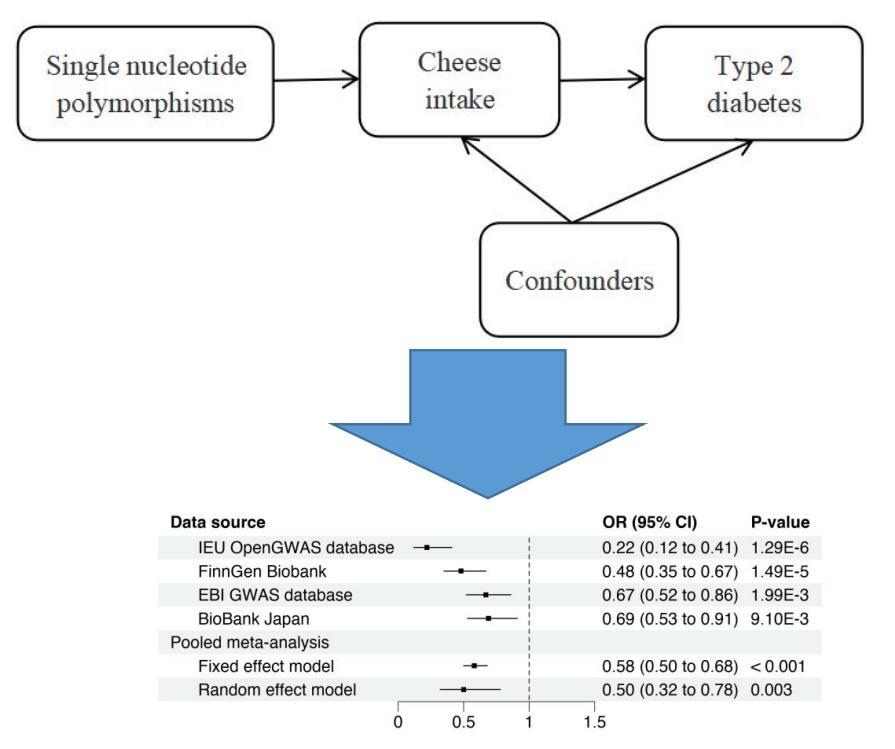Current issue
Archive
Manuscripts accepted
About the Journal
Editorial office
Editorial board
Abstracting and indexing
Subscription
Contact
Ethical standards and procedures
Most read articles
Instructions for authors
Article Processing Charge (APC)
Regulations of paying article processing charge (APC)
RESEARCH PAPER
The causal association of cheese intake with type 2 diabetes mellitus result from a two-sample Mendelian randomization study
1
Department of Cardiology, The First Hospital of Nanchang,Nanchang 330008, China
2
Department of Cardiology, Guangdong Provincial People's Hospital, Guangdong Academy of Medical Sciences, Southern Medical University, Guangzhou, 510080, China
Submission date: 2024-02-04
Final revision date: 2024-04-14
Acceptance date: 2024-04-28
Online publication date: 2024-05-01
Corresponding author
Yu-qing HUANG
Department of Cardiology, Guangdong Provincial People's Hospital, Guangdong Academy of Medical Sciences, Southern Medical University, Guangzhou, 510080, China
Department of Cardiology, Guangdong Provincial People's Hospital, Guangdong Academy of Medical Sciences, Southern Medical University, Guangzhou, 510080, China
KEYWORDS
TOPICS
ABSTRACT
Introduction:
Worldwide, type 2 diabetes is a major health concern with numerous risk factors. In observational studies, cheese consumption has been linked to type 2 diabetes, however it is still unclear whether these relationships are causal. To ascertain these relationships, we performed a two-sample Mendelian randomization (MR) study.
Material and methods:
A summary of cheese intake statistics from UK Biobank and publicly available genome-wide association studies (GWAS) for type 2 diabetes from IEU OpenGWAS, FinnGen Biobank, EBI GWAS, and Biobank Japan, respectivel. The primary method was pooled meta-analysis with the inverse variance weighting method. The sensitivity analyses included MR-Egger regression, weighted median, weighted mode, and leave-one-out. MR estimations of causation were reported as odds ratios (OR) with 95% confidence intervals (CI).
Results:
In the pooled meta-analysis of the fixed and random effect model, the combined ORs for type 2 diabetes were 0.58 (95% CI: 0.50-0.68, P<0.001) and 0.50 (95%CI: 0.32-0.78, P=0.003) per standard deviation rise in the levels of cheese intake. Sensitivity analysis revealed no horizontal pleiotropy (all P>0.05) but heterogeneity (all P<0.05).
Conclusions:
We found that moderate consumption of beneficial cheese may reduce the risk of type 2 diabetes. These findings suggested that increasing cheese intake appropriate for humans may help prevent and control type 2 diabetes.
Worldwide, type 2 diabetes is a major health concern with numerous risk factors. In observational studies, cheese consumption has been linked to type 2 diabetes, however it is still unclear whether these relationships are causal. To ascertain these relationships, we performed a two-sample Mendelian randomization (MR) study.
Material and methods:
A summary of cheese intake statistics from UK Biobank and publicly available genome-wide association studies (GWAS) for type 2 diabetes from IEU OpenGWAS, FinnGen Biobank, EBI GWAS, and Biobank Japan, respectivel. The primary method was pooled meta-analysis with the inverse variance weighting method. The sensitivity analyses included MR-Egger regression, weighted median, weighted mode, and leave-one-out. MR estimations of causation were reported as odds ratios (OR) with 95% confidence intervals (CI).
Results:
In the pooled meta-analysis of the fixed and random effect model, the combined ORs for type 2 diabetes were 0.58 (95% CI: 0.50-0.68, P<0.001) and 0.50 (95%CI: 0.32-0.78, P=0.003) per standard deviation rise in the levels of cheese intake. Sensitivity analysis revealed no horizontal pleiotropy (all P>0.05) but heterogeneity (all P<0.05).
Conclusions:
We found that moderate consumption of beneficial cheese may reduce the risk of type 2 diabetes. These findings suggested that increasing cheese intake appropriate for humans may help prevent and control type 2 diabetes.
We process personal data collected when visiting the website. The function of obtaining information about users and their behavior is carried out by voluntarily entered information in forms and saving cookies in end devices. Data, including cookies, are used to provide services, improve the user experience and to analyze the traffic in accordance with the Privacy policy. Data are also collected and processed by Google Analytics tool (more).
You can change cookies settings in your browser. Restricted use of cookies in the browser configuration may affect some functionalities of the website.
You can change cookies settings in your browser. Restricted use of cookies in the browser configuration may affect some functionalities of the website.



